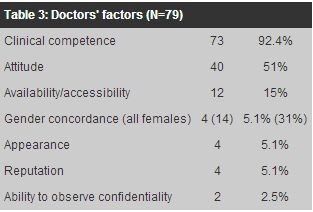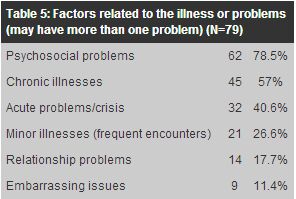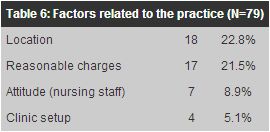
|
January 2003, Volume 25, No. 1
|
Original Article
|
"Tell me about your most loyal patients": Doctors' perceptions on factors affecting the doctor-patient relationshipA K Y Cheung 張潔影, C S Y Chan 陳兆儀 HK Pract 2003;25:6-16 Summary
Objective: To identify factors which Hong Kong doctors perceived
as salient in maintaining doctor-patient relationship.
Keywords: Doctors' perception, doctor-patient relationship 摘要
目的: 識別香港醫生認為維持醫生與病人關係的重要因素。
Introduction A doctor-patient relationship is regarded as successful when the consultation ends up with satisfaction to both the patient and the doctor. The importance of the doctor-patient relationship in healthcare was emphasised both by Fabb1 and Munro2 when they delivered the Dr Sun Yat Sen Oration in 1996 and 2000 respectively. It has also been stated that 'Doctor-patient relationship is neither a luxury nor an optional extra, but an integral component of clinical method and practice';3 and it is 'through the relationship that the effectiveness of our work as healers is mediated.'4 To be aware of the contributions of different factors on the doctor-patient relationship may help doctors to improve quality in healthcare. Objective To identify factors which Hong Kong primary care doctors perceived as salient in establishing or sustaining doctor-patient relationships. Method and analysis Eighty students in the Diploma in Family Medicine course were asked to review their own practice: by selecting one family and one individual patient who had consulted them for a long period of time; and to identify factors that had made their doctor-patient relationships successful. The analysis of the results is mainly qualitative, based on accounts written in essay form. The type and number of factors described and identified by the doctors were also categorised and counted. The authors reviewed the essays independently to identify and categorise the common themes and emphases in the accounts, and resolved their differences by discussion. The factors so identified were analysed under the following categories, namely: factors related to the doctor, the patient, the consultation process, the patients' problems or illnesses, time, and the practice. Results A total of 79 essays were received. The factors identified were the views of the doctors, except in one case where a doctor sent an e-mail to his patient to ask her why she was being so loyal to him. Over 20 factors were identified. In most situations, multiple factors contributed to the relationship. Doctor's profiles Doctors studying for the Diploma course (2000-2001) had a diversity of backgrounds (Table 1). Fifty-eight percent were local graduates. The majority (84%) were in private practice and only 18% of students were female. The average number of years in general practice was 7 years. Eighteen of them reported patients or families who had been their patients for less than three years, 35 described patients who had been consulting for 3-10 years, 17 described patients who had been consulting for over 10 years, while 9 did not indicate the duration of the doctor-patient relationship. (Table 2)
Factors affecting doctor-patient relationship:
Clinical competence was cited by the majority of doctors as a major determining factor for successful doctor-patient relationships. Patients suffering from illnesses would certainly like to have their symptoms relieved and disease cured as soon as possible and the ability to do so would obviously enhance the relationship. To achieve this, detailed history taking, comprehensive physical examination and explanation are required. The following are the clinical competences described by the doctors: "...quick relief" "accurate diagnosis" for example diagnosing hyperthyroidism rather than 'neurosis' as labelled by another doctor; early diagnosis of colon cancer and tuberculosis. "effective management" for example proper management of acute conditions like asthma and burns, chronic illnesses like diabetes and hypertension, correcting improper breast feeding technique etc. "ability to handle psychological issues" Several doctors mentioned that participating in continuous medical education and updating knowledge enabled them to deliver competent care with confidence. Rudeness had been cited as one of the most important reasons why patients change their GPs.5 Attitude was described by half of the doctors to be an important factor. A great diversity of terms were used by the doctors to describe attitude favourable to the development of successful doctor-patient relationships, for example: sincere, gentle, courteous, warm, friendly, showing respect. Care and concern are regarded as important and 'a short cut to creating a good doctor-patient relationship'. Only a few mentioned that they are non-judgmental, and one said that he was "sentimental but rational". One doctor mentioned that one must be congruent in one's behaviour because the patient can 'see it, feel it and appreciate it'. Fifteen percent of doctors thought that being readily available was beneficial in sustaining the relationship. For example, "Accessible by phone or paging..." "...answer any phone call, ...even outside normal office hours..." and "Allow patients to make an appointment for consultation with minimal waiting time". Only 4 out of 14 female doctors thought that it is easier to establish a successful relationship with the same sex. None of the male doctors thought gender has any bearing at all. One of the female doctors wrote, 'I am female, they can share the personal problems without embarrassment'. Five percent of doctors thought that appearance of the doctor might have an effect on the doctor patient relationship. Favourable appearances are: "Young and energetic" "Appearing confident" "Appearing calm".
Twenty-five percent of doctors thought that their patients simply have trust in doctors. One doctor wrote: "...they trust me right from the beginning" There is a bonding between the patient and the doctor when for one reason or another, such as a reduction of consultation fee, the patient is grateful to the doctor. The doctors who identified this factor felt that it was easier for them to communicate with patients if they had more or less the same cultural or social background. One doctor thought that he felt comfortable when his patient was of the "same origin, same root, same mother tongue and culture". This concurred with Lam6 who stressed the importance of cross-cultural barriers between patients and doctors. Four doctors were aware of the development of dependency, and one of the development of transference. This is important because it may suggest that the relationship may be too close and 'a degree of detachment is necessary for appropriate diagnosis and management'.3 The following are examples: a. One individual patient attended the doctor 220 times within a period of 2-3 years. b. "...during weekends, I will invite them to my barbecue party and it is fun to share their family activities too". On 11 occasions, the patients attended the present doctor because they were unhappy with the previous doctors. Nine out of 11 (82%) were because of communication problems. This finding further emphasised the importance of communication in establishing successful doctor-patient relationships. One of the remainder was because the patient regarded the doctor as incompetent and the last one was 'because the doctor is frightening and makes children cry'.
A patient-centred approach providing comprehensive personalised care, including preventive care, taking into consideration the patient's context, and negotiating treatment plans with patients, is welcomed by patients, as shown in the following quotes: "I understand their illness not only in terms of some rigid facts of pain or discomfort, but also in terms of their psychological status and mentality." "There is a match between the patient's needs and expectations and my service provision through effective and efficient communication process..." The adoption of a patient-centred approach during the consultation process was also described as important in establishing a doctor-patient relationship.
It has been said "many errors in medical practice have their origins in a failure of communication".7 Most doctors in this study (92.4%) thought that effective communication which includes active listening, allowing patients to express feelings, inviting and allowing patients to ask questions and answering them, detailed exploration of the problems and clear explanation in management, are important in establishing good doctor-patient relationships. The following are some of the quotes extracted from the essays: "I am a good listener" "All she needs is a doctor to talk to..." "...using clearly understood words for questions, comments and explanation" "...allow patient to express feelings and fears" In addition, 17.7% (14/79) of the doctors stated that offering individual and family counselling are important: "I tried my best to counsel this family which rewarded me with a very good doctor-patient relationship". It has been said that 'clarifying expectations, negotiating perceived and actual roles and dealing with one another in a personalised and individualised manner are essential to effective professional-patient relationship.8 Fifty-seven percent of the doctors in this study opined that responding to the needs and expectations of their patients and involving them in treatment plans contributed to the successful relationships. The following are some quotes: "...difficulties faced by the patient were acknowledged and views shared, a team spirit was cultivated..." "...agreement between patient and doctor about...nature of problem and course of action...successful outcome" "...a match between patient's needs...and my service provision..." "I involved the patient in decision-making". Only 38% of doctors thought that health promotion or preventive care were important in fostering the doctor-patient relationship. The health promotion activities which were implemented were mostly related to existing problems such as diabetes, coronary heart disease, chronic obstructive airway disease etc. In fact, Fraser9 commented on our doctors, that 'although many doctors were able to recognise appropriate opportunities for health promotion and disease prevention, they tended to respond in a very mechanistic way'.
Patients with psychosocial problems as described in this study were impressed by doctors who were willing and able to manage their psychosocial problems apart from their physical problems. One doctor wrote that 'help from a psychologist or social worker might stigmatise their problematic identity'. This is particularly true for Chinese patients who normally reject psychological or psychiatric diagnoses. Patients also valued very much the support from doctors during lifecycle adjustments such as bereavement and becoming new parents. The relationships with these patients were built up over time. The repeated encounters, regardless of the duration, will have a cumulative effect on the doctor-patient relationship. One doctor wrote: '...rapport and trusting relationship reinforced in every visit...'. The problems described ranged from 'fish bone inside the throat', serious illnesses like cancer or respiratory distress, to life crises such as bereavement or divorce. Patients were shown to be grateful to the doctors who were capable of treating the acute conditions and gave support to them during crises. "I listened to her pain, sadness and stress after her husband died and sympathised with her in her grief...".
Twenty-nine percent of the doctors in this study stated that enough time for the consultation would increase patient's satisfaction and thus enhance the relationships. The following are some quotes from the essays: "...they do not feel rushed during the consultation..." "...long consultation time..." "Time spent in building doctor-patient relationship may be time saved in communicating about episodic problems..." This is in agreement with Howie10 who, by using 'enablement' as a measure of quality in healthcare, demonstrated that a higher score was associated with longer consultation. Longitudinal care of a patient over time was another time factor. A doctor noticed that he has "gone through life with the patient" and experienced together with the patient the illness and events that had happened to the patient.
A convenient location of the practice which is within walking distance from the patients' home or workplace, was regarded by some doctor (22.8%) as one of the factors in establishing the doctor-relationships. Although 21.5% of the doctors regarded the consultation fee as one of the factors which affected doctor-patient relationships, they did not regard it as the most important factor. The attitude of the nursing staff was considered important in fostering the relationship by 8.9% of the doctors in this study. One doctor wrote: "...her caring attitude, behaviour, good manner, politeness...facilitated the doctor-patient relationship...". Only a few (5.1%) thought that the clinic setup made any contribution to the establishment of doctor-patient relationships. The 'setup' these doctors referred to was: "...attractive toys and candies..." "...clean environment..." "...computerised record..." "...sofas instead of classical clinic benches...".
Discussion Although these observations were based on individual doctor's self report on one patient and one family out of their many patients, the factors identified are in line with the factors cited in other studies about doctor-patient relationships.11-14 There are only 79 doctors in this study, but they are from a diverse background covering a wide spectrum of both public and private general practice in Hong Kong. Many similar factors and themes were repeatedly generated from their accounts. It is reasonable to conclude that we have exhausted the factors that most primary care doctors believed would contribute to good doctor-patient relationships. Over twenty factors affecting the doctor-patient relationship were identified by the doctors in this study. Multiple factors were involved in establishing or sustaining these relationships and varied in their magnitude of effect under different clinical situations. Most doctors identified important factors such as effective communication, clinical competence, appropriate attitude and partnership with patients. These doctor-generated factors are also congruent with patients' views.12,13 Only about 38% of doctors stated that delivery of preventive care or health promotion was important in fostering the doctor-patient relationships. It is difficult to tell from this study whether the doctors were unaware of the importance of preventive care, or whether their patients failed to recognise the importance, and did not have a strong desire to receive it; or whether the doctors were just responding to the patients' expectations or 'non-expectations'. The doctors' ability and willingness to handle psychosocial issues and give support to their patients during a crisis played an important role in establishing and sustaining doctor-patient relationships. However, in an effort to establish and sustain the doctor-patient relationship, there are indications that some doctors may have over-committed themselves, and the relationships appeared a bit too close. The following are some of the examples:
a. "...there is absence of time constraint on the duration of consultation..." Although there may be some other underlying reasons leading to this behaviour, it is important for family physicians to be aware of over commitment because 'too close a relationship may adversely affect the clinical process by increasing the doctors' anxiety, by encouraging dependency of the patient on the doctor, or by preventing the doctor from retaining a degree of appropriate emotional detachment'.3 Conclusion In these times of deteriorating trust between patients and doctors, it is refreshing to see so many examples of good doctor-patient relationships in the community. Doctors can do their part in promoting better doctor-patient relationships by modifying the factors amenable to their control: such as improving their clinical competence and communication skills, demonstrating a sincere, caring attitude and adopting a patient-centred partnership approach to patient care. With the current "less busy" private practice environment, spending more time and knowing how to spend quality time with the patient may also help to enhance the doctor-patient relationship. With a renewed effort, we may regenerate the trust that patients once had in Hong Kong doctors. Acknowledgement The authors would like to thank Professor J A Dickinson for his valuable suggestions, and the Diploma in Family Medicine students (Class of 2000-2001) for their contributions. Key messages
A K Y Cheung, MBBS(HK), DFM(CUHK), FRACGP, FHKAM(Family Medicine)
Private Practitioner, C S Y Chan, MD, LMCHK, FRACGP, FHKAM(Family Medicine) Associate Professor, Department of Community and Family Medicine, The Chinese University of Hong Kong. Correspondence to : Dr A K Y Cheung, c/o: Department of Community and Family Medicine, The Chinese University of Hong Kong, 4/F, School of Public Health, Prince of Wales Hospital, Shatin, N.T., Hong Kong.
References
|
|





